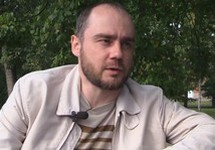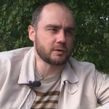
Legal Case in Chelyabinsk Raises Specter of Regional Separatism in Russia
Publication: Eurasia Daily Monitor Volume: 13 Issue: 27
By:

As more and more low-level or hushed-up evidence makes clear, the Kremlin’s Ukraine gambit may have serious, unexpected domestic ramifications for the Russian Federation, such as increasing the likelihood of regional separatism—a prospect not seriously considered since the early 2000s and the end of Russia’s second war in Chechnya. In January 2016, the Chelyabinsk regional authorities detained Aleksei Moroshkin, a blogger and founder of the Church of the Chelyabinsk Meteorite. Moroshkin, who sometimes goes by the name “Andrew Brave,” is accused of violating Article 280.1 of the Russian criminal code (incitement to separatism) for leading VKontakte groups under slogans like “Fighting for Ukraine!” “Free the Urals!” and “Together Against Evil!” Moroshkin is also accused of violating Article 214 (vandalism) of the Russian criminal code for painting the statue of Vladimir Lenin in the center of Chelyabinsk in the colors of the Ukrainian flag (Sova-center.ru, January 20).
Moroshkin himself first identified with Russian nationalists and, on March 2, 2014, flew to Simferopol to join so-called “self-defense” units. After the annexation of Crimea, Moroshkin spent time in Kharkiv, where he participated in the storming of the regional administration building. His final tour of duty in Ukraine took him to the eastern Ukrainian region of Donbas, where he fought with the “Vostok” battalion under the leadership of Alexander Khodokovksy. Having participated in the fighting in Ukraine, Moroshkin then gave an interview to TV Rain (Dozhd), in late May 2014, in which he was critical of the “Russian Spring” and the intervention in Donbas. As quickly as a year after his participation in the conflict, Moroshkin declared to an Open Russia blogger that the Russian intervention in Ukraine was an act of “geopolitical menacing” and that “under the influence of experience gained in the war, [he] had ceased to be a Russian nationalist and became a regional nationalist.” Moroshkin has also become critical of both sides of the war in Ukraine, saying that it is a strange conflict, and the Russians should instead focus on building up their own country (Grani.ru, September 16, 2015). As a disaffected Russian nationalist, Moroshkin illustrates the dangers inherent in the Kremlin’s strategy of commandeering the nationalist bandwagon, as it did by annexing Crimea and inciting war in Donbas.
The Federal Security Service (FSB) first raided Moroshkin’s apartment on August 10, 2015. It was not clear whether he was immediately detained following this investigation, as he is shown on several Open Russia videos walking freely throughout Chelyabinsk. In an interview with a blogger, Moroshkin openly talked about a “people’s democratic republic of the Urals.” In his VKontakte groups, Moroshkin has spoken against “the dictatorship of Moscow” and advocated the division of the country into an equitable federal union such as in the United States of America. According to Moroshkin, the self-declared autonomous “Urals Republic,” which existed for four months in 1993 under the leadership of former Sverdlovsk Oblast governor Eduard Rossel, as well as the historical legacy of Yemelyan Pugachev’s Cossack Rebellion (1773–1774) have left the wider Urals region with a precedent for separatism and a useable past. Moroshkin is unequivocal in stating that the “Russian-Ukrainian conflict arouses the separatist sentiments of the Urals and other Russian regions. The hypothetical new Urals republic would have its capital located in Ekaterinburg [to be renamed “Aydagrad”] and would unite all the other regions of the Urals Federal District, he proposed. For the promotion of separatism, Moroshkin is facing up to five years in prison (Uralpolit, January 18). Moroshkin’s website has since been blocked by the authorities; the last post appearing there is dated September 24, 2015 (Pn14.info, January 21).
Moroshkin paints a rather intriguing, and sometimes even comical, figure. The “Church” that he established in 2014—the Church of the Chelyabinsk Meteorite—takes as its inspiration the 2013 meteorite over Chelyabinsk that eventually fell into a nearby lake. The Church claims that the meteorite signaled the arrival of a new testament. His religion’s other beliefs include perceiving the end of times as heralded by the destabilization of Syria. Among the more puzzling demands of the Church are calls for the regional authorities to retrieve the meteorite, which fell in 2013, and “place it in the hands of priest-psychics, in fulfillment of the mission for which [Moroshkin/Brave] was placed on Earth” (Vk.com, January 25). Moroshkin’s religious organization has not yet received serious funding and seems limited in its appeal to a minority of fringe supporters. More immediately, the Church has also complained about the lack of transparency surrounding the criminal case against its leader.
Some commentators on the Internet have speculated that Moroshkin’s stunts are something akin to a joke, a claim that Chelyabinsk political scientist Alexander Melnikov rebuts: “Any joke can remain so as long as it is limited to rare frequency and short duration. If it lasts a long time and consistently uses the same propaganda tools and public acts ‘to joke’ for one and the same, even the most sensitive and disinterested observer will begin to take this seriously” (Uralpolit, January 18). Still, Moroshkin’s “Church” remains so small and some of its claims are so highly dubious, that the Federal authorities may have drawn more attention to the case by their actions than they would have had they left it alone. That the Federal authorities are taking the case so seriously suggests just how sensitive the Russia authorities are to such developments as a resurgence of regional nationalism in the strategic heart of the country.




